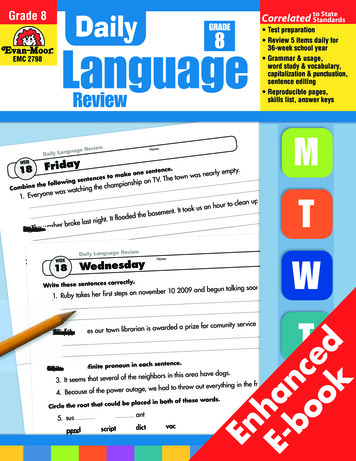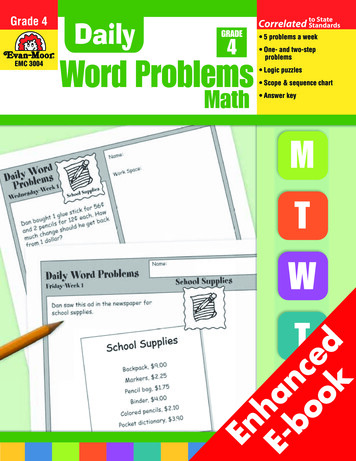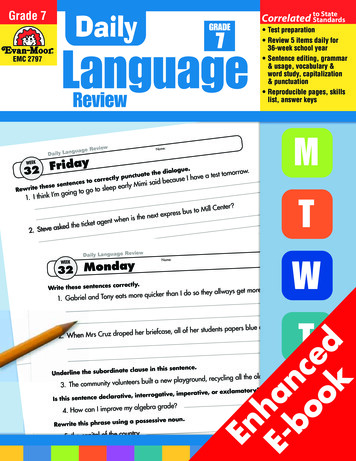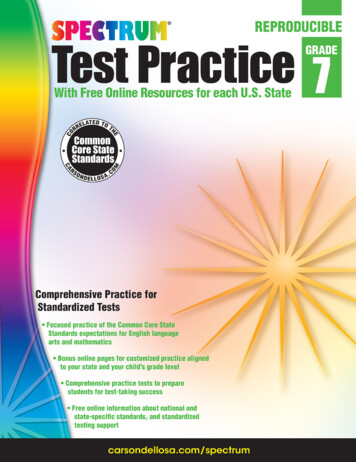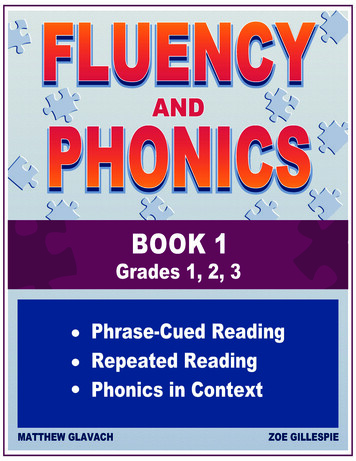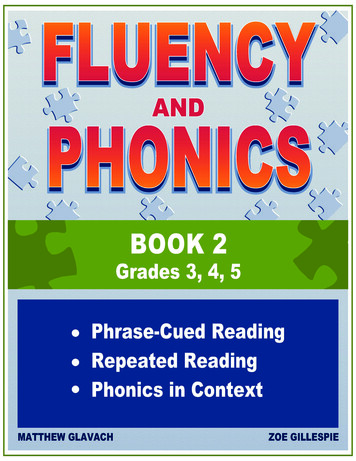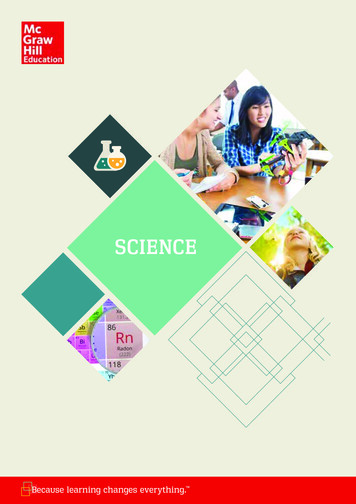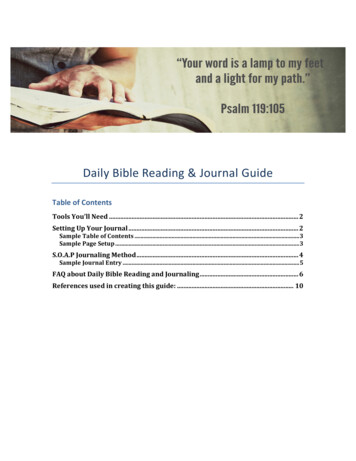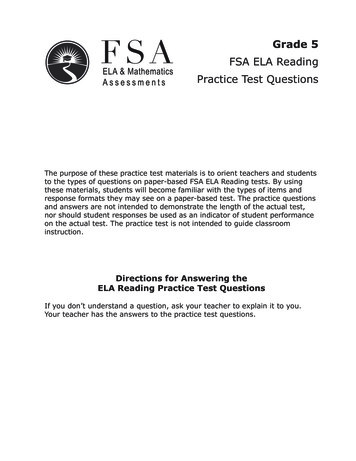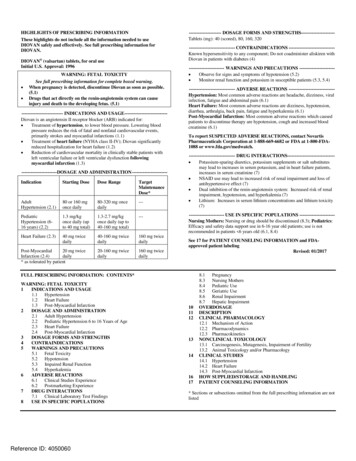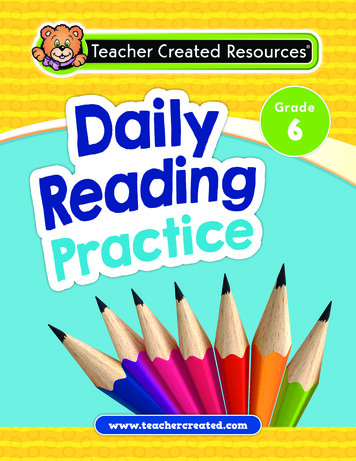
Transcription
Grade6www.teachercreated.com
Nonfiction: AnimalsName DateWarm-Up 1The OctopusThe word octopus means eight feet. That is how the octopus got its name. The octopus is an animalthat has eight arms that extend from the center. It eats small crabs and scallops along with fish, turtles,and crustaceans. It is even known to eat other octopuses. The octopus is able to catch its prey with itslong arms. It then bites the prey and poisons it with a nerve poison. This poison softens the flesh andthe octopus is then able to suck the flesh of the animal out of its shell or outer covering.The octopus can mostly be found hunting during nighttime. Some people fear the octopus, but there isonly one octopus that has been known to have a poison that is strong enough to kill a person. This isthe Australian blue-ringed octopus.Along with its eight arms, the octopus has a head with two eyes on either side. It has very goodeyesight. The octopus does not have hearing. Each arm has suction cups in two rows. These suctioncups help the octopus hold things. It is true that if the octopus loses an arm it will grow back. Theoctopus also has blue blood.The octopus lives in dens and crevices of the ocean floor. This protects the octopus from its mainpredator, the moray eel. It also provides a place for the octopus to lay its eggs. The octopus can squirtblack ink as a defense against its enemies.Story Questions1. What is one feature that the octopus does not have?a. good eyesightb. excellent hearingc. blue bloodd. the ability to squirt ink2. This passage is mostly about . . .a. the description of and eating practices of the octopus.b. how an octopus eats.c. anatomy of the octopus.d. how the octopus defends itself.3. What is the meaning of the word extend as used in the passage?a. ingestb. spreadc. ignored. arrange Teacher Created Resources, Inc.9#3492 Daily Warm-Ups: Reading
Nonfiction: AnimalsName DateWarm-Up 2ToucanWhat do you know about the colorful bird called the toucan? Did you know that this bird comes fromSouth America? It is found living in small flocks in the rain forest. This bird does not fly very well. Itmanages to get around by hopping from tree to tree. The toucan lives in holes in the tree. It makes acroaking sound.The toucan has brightly colored feathers that are very light. The toucan has four toes on its feet. Twoof the toes face frontward, and two of the toes face backwards. This helps the toucan grasp the branchof the tree easily and hold on. A large bill protrudes from the front of the toucan. The bill is largerthan the toucan’s head and is a third of the size of the toucan. The average toucan reaches 20 inchesin length. The male toucan is a little bit larger than the female, but unlike many other birds, they havevery similar coloration.Living in the rain forest, the toucan eats mostly fruit but it also eats insects, bird eggs, and tree frogs.The fruit is eaten whole and then the toucan will regurgitate the seeds back up. This allows the seeds tocontinue growing in the rain forest.The female toucan lays up to four eggs at a time. These eggs are laid in the holes of the trees where thetoucans live. The male and female work together to incubate the eggs and care for the chicks.Story Questions1. A good title for this reading passage would be . . .a. “Toucan Paradise.”b. “The Rain Forest’s Bird.”c. “All You Want to Know About the Toucan.”d. “Illegal Killing of the Toucan.”2. The author wrote this passage to . . .a. justify keeping the toucan in captivity.b. inform the reader of how toucans are mistreated.c. share general information about the toucan.d. raise awareness of the shrinking numbers of toucans in the rain forest.3. What can you infer about toucans from this passage?a. that toucans have many predatorsb. that toucans spend a lot of time in treesc. what toucan chicks look liked. what the colors of the toucan's feathers are#3492 Daily Warm-Ups: Reading10 Teacher Created Resources, Inc.
Nonfiction: BiographyName DateWarm-Up 2Catherine BertiniCatherine Bertini is a voice of inspiration to many people who are starving in the world. Catherinewas the head of the World Food Programme (WFP) and served to prevent hunger and starvation acrossthe world. She has worked with countries around the world that have starving people. She believesstrongly that if you get the food to women, then children and all others will be fed. Her goal is to endhunger.Catherine wasn’t always helping the poor and hungry. At one time she wanted to be a music teacher.She was raised in Cortland, New York. Later her interests turned to government service. She felt thatshe could make more of a difference helping others this way. And what a difference she has made!She has seen 25 countries go from receiving emergency money to being able to provide food for peoplein their countries.Catherine Bertini has very high goals. She works to see that 80% of the food goes to women. Sheknows that women will feed the people. In the past, most of the food has gone to men. She hasanother goal, and that is to help girls go to school. She sees to it that there are meals available for thegirls at school. This has encouraged families to send their girls to school. Catherine Bertini is makinga difference in the lives of millions.Story Questions1. What position did Catherine Bertini hold?a. She was delegate to the U.N.b. She was volunteer.c. She was Ambassador to Africa.d. She was head of the World Food Programme.2. What can be inferred about Catherine Bertini’s beliefs of women and their care of children?a. She believes women will feed children and others.b. She believes that women are dying.c. She believes that men aren’t as hungry as women.d. She believes that women are stronger.3. What does the passage say about how Catherine Bertini’s encourages girls to attend school?a. She teaches them the importance of learning to read.b. She makes sure that meals are provided for girls at school.c. She sets a good example by sharing her own school experiences.d. She gives presentations on the importance of getting an education. Teacher Created Resources, Inc.27#3492 Daily Warm-Ups: Reading
Nonfiction: BiographyName DateWarm-Up 3Mother TeresaFor most people, the name Mother Teresa symbolizes unconditional love and support. She was asymbol of hope to many dying and sick people around the world. Mother Teresa was born AgnesGonxha Bojaxhiu in Macedonia. She was the youngest of three children. She went on to become anun in the Catholic Church. One of her first assignments was work at a mission in India. The missionran the schools. This is where Agnes took on the name Sister Teresa. A year later, Sister Teresa arrivedin Calcutta to teach at St. Mary’s High School.She would eventually move to the slums of Calcutta to live and set up a school. She gave every centshe ever earned to the hungry and poor. She opened an orphanage to house children who had noparents and were dying. She won many prizes for her great work, and each time she would use themoney from the prizes to house or feed people. In 1979, she won the Nobel Peace Prize.Through the years, her name changed to Mother Teresa. She was indeed a mother to many. But lifewas not easy for her. She would struggle with heart problems and other illnesses, but her efforts tohelp those in need continued until the day she died. Mother Teresa’s examples and words of wisdomcontinue to inspire millions.Story Questions1. What Mother Teresa’s original name?a. Sister Teresab. Agnes Teresa Bojaxhiuc. Mother of Calcuttad. Agnes Gonxha Bojaxhiu2. What can be inferred about Mother Teresa since she was the winner of the Nobel Peace Price?a. She was a U.S. citizen.b. She worked for peace in the world.c. She received the highest honor awarded to Catholic nuns.d. She would go on to win the Medal of Freedom.3. After reading the passage, which of the following words could be used to describe Mother Teresa?a. studiousb. notoriousc. ruggedd. empathetic#3492 Daily Warm-Ups: Reading28 Teacher Created Resources, Inc.
Nonfiction: American HistoryName DateWarm-Up 1Yankee DoodleHave you sung the song “Yankee Doodle” and wondered what it was talking about? Did you knowthat “Yankee Doodle” was sung by the British soldiers during the Revolutionary War? They sang thissong to make fun of the American soldiers and troops. The British soldiers had fancy uniforms to wearwhile the Americans didn’t have any uniforms to wear. Some of the American soldiers wore buckskinand furs.Many of the words in the song have different meanings than the ones we use today. Yankees was thename the British soldiers called the American soldiers. Doodle was another name for hicks or countrybumpkins. Macaroni in the song didn’t refer to pasta, but rather to a fancy style of dress used inEngland.Surprisingly enough, the American troops liked the tune of the song. They made up their own wordsto the song and sang it as they went into battle. They created many verses to the song. Some saythere have been 190 verses of the song. It’s been said that when Commander Cornwallis of the Britishsurrendered, an American band played, “Yankee Doodle.”Story Questions1. In this reading passage, what does the word “doodle” refer to?a. a type of noodleb. to scribble or drawc. someone who is a hickd. sophisticated person2. Macaroni was a style of . . .a. government.b. pasta.c. military strategy.d. dress.3. What was the purpose of the British soldiers singing the song “Yankee Doodle”?a. to scare the American soldiersc. to challenge the American soldiersb. to make fun of the American soldiersd. to inspire the American soldiers4. What would be another title for this passage?a. “The Making of Macaroni”b. “The Revolutionary War”#3492 Daily Warm-Ups: Readingc. “The British vs. the Americans”d. “The History of Yankee Doodle”42 Teacher Created Resources, Inc.
Nonfiction: American HistoryName DateWarm-Up 2The Gold RushCan you imagine finding gold? This was the quest of many people who arrived in California in 1849.They were searching for gold. Gold had been found and so everyone wanted a piece of it. This wascalled the Gold Rush. People came from all over the world to find gold. Villages sprang up overnight.Tents formed these temporary villages that were set up wherever gold was discovered. These villageswould be abandoned as soon as gold was found elsewhere.Many gold prospectors were able to strike it rich. Some found thousands of dollars worth of goldnuggets or gold dust. Not everyone was so lucky. With so much gold around, the price for items wentup and up. People had to spend a lot of money to buy food and supplies. They spent all of their moneytrying to find the gold that was never to be found. Most went home broke.Years later, gold was found in 1896 near the Klondike River in Canada’s Yukon Territory. This sparkedanother gold rush. Within a year over 100,000 men and women arrived in Canada. It was a long tripand many would never complete it because of the cold weather and the raging rivers. People died alongthe way. Most of the people that did make it to the Yukon were not able to find gold in Canada, andsoon the Gold Rush was over.Story Questions1. What brought so many people to California in 1849?a. They were seeking gold.b. They were starting a new territory.c. They were sent by the federal government.d. They were fighting in the Mexican War.2. The author wrote this passage to . . .a. justify the reasons people went to California.b. inform the reader of how gold miners were not mistreated.c. share general information about the Gold Rushes in North America.d. raise awareness of mistreatment of immigrants to California.3. Which of the following statements is a fact about the results of the Gold Rush?a. Many had their land taken away from them.b. Gold Rushers spent all of their money in land.c. With gold around, prices for food and supplies went up.d. With so much gold around, people were robbed. Teacher Created Resources, Inc.43#3492 Daily Warm-Ups: Reading
Nonfiction: ScienceName DateWarm-Up 2MatterWhat is matter? Everything is made up of matter. Matter is made up of tiny particles called atoms,molecules, or ions. Matter is ordinarily found in three states. These states are liquid, gas, or solid.There are two forces at work regardless of the state of matter. These two forces are energy andattraction. Energy makes the matter move. Attraction pulls and keeps the particles together.Solids are packed together. Examples of solids are wood, plastic, stone, and iron. You can hold solidsin your hand. Liquids are a state between gases and solids. Liquids flow and change shape. The bestexample of a liquid is water. Gases are floating around you and inside bubbles. Gases don’t have anyparticular shape, but they are fluid. They can also be compressed. Vapor and gas mean the same thing.Matter can change from one state to another. For example, a liquid can change to a solid or gas. Solidscan change to a liquid. Temperature influences the changes in matter from one state to another. Forexample, heating a liquid can turn it into a gas. Cooling or freezing a liquid can turn it into a solid.Scientists continue to study matter, molecules, and ions to better understand our world.Story Questions1. After reading the passage, what do you think would happen if a liquid was boiled?a. It would immediately double in size.b. It would turn into a gas.c. It would turn into a solid.d. Scientists have not yet determined what happens in this case.2. The main idea of this passage is . . .a. to inform the reader about what happens when it is raining.b. to inform the reader about the definition of matter.c. to inform the reader about how important it is to see ice, rain, and condensation.d. to share general information about the universe and how it is organized.3. Where can you find information about the three types of matter?a. second paragraphb. all three paragraphsc. third paragraphd. first paragraph#3492 Daily Warm-Ups: Reading58 Teacher Created Resources, Inc.
Nonfiction: ScienceName DateWarm-Up 4HurricanesHave you ever been in a hurricane? Hurricanes are serious weather storms. They can do a lot ofdamage. But what is a hurricane? Another name for a hurricane is a tropical cyclone. A hurricaneconsists of thunderstorms, torrential rains, and waves with winds up to 75 mph or higher. A hurricaneis a tropical storm that starts out in the ocean and gathers speed and strength as it travels.When the winds inside these storms reach 39 mph, they are given names. An international committeedeveloped the list of names. Hurricanes alternate back and forth between male and female names.Giving the hurricanes names makes it easier for meteorologists to identify and track certain storms.This makes it easier to announce hurricane warnings, as well.The best place to be during a hurricane is indoors and away from windows and doors. If the hurricaneis very bad, you will probably be asked to evacuate and move to safer ground. It’s important to keepa kit ready that contains fresh water, non-perishable food, first aid kit, flashlight, rain gear, and otheritems that would be useful if you had to leave your home for a few days.Story Questions1. How fast does a tropical storm need to be moving in order to receive a name?a. 25 mphb. over 39 mphc. 100 mphd. over 76 mph2. Where would you find the answer to the previous question?a. second paragraphb. third paragraphc. in the titled. none of the above3. What is the definition of the word non-perishable as used in the passage?a. long-lastingb. freeze-driedc. emergencyd. fresh#3492 Daily Warm-Ups: Reading60 Teacher Created Resources, Inc.
Nonfiction: Current EventsName DateWarm-Up 8Money or Hard Work?Can money make you successful? Most people seem to think so, but think again. It depends on yourdefinition of success. Some of the richest people in the world are far from successful. There is noargument that money brings with it many opportunities that may otherwise be unrealized. Money canbuy opportunities and materials. But money is not the only key.Tesa was born in Africa in the poorest of countries. She was without adequate nutrition and care formost of her childhood. At the age of 16, she was determined to stay in school, though most of the othergirls her age were leaving to marry or to help provide for their families at home. Girls were just notencouraged to get an education. But Tesa worked at school during the day and in the fields at night.By the moonlight, she would pick crops that were often devastated with drought and pests.All of this hard work paid off. When Tesa turned 17, a traveling professor from England noticed herhard work and skill. He was amazed with her intellect. This professor invited her to attend one of themost prestigious universities in England. Since that time, Tesa has become a distinguished professor.Luck, you may say? Tesa would probably disagree with you. She would say that her hard work anddedication got her where she is today.Story Questions1. Which of the following best describes the author of this passage?a. reticent and quietb. obnoxious and loudc. frustrated and demandingd. encouraging and motivational2. Which statement below helps support your answer to the previous question?a. Many are left without the skills they need to survive in today’s world.b. Girls were just not encouraged to get an education.c. Job wages have continued to be lower than they should be.d. She would say that her hard work and dedication got her where she is today.3. What is meant by the word distinguished as used in this passage?a. annoyingb. differentc. challengingd. illustrious Teacher Created Resources, Inc.79#3492 Daily Warm-Ups: Reading
Nonfiction: Current EventsName DateWarm-Up 11Save the Rain forestFor as long as I can remember, I have been taught to preserve the rain forest. In elementary school,I raised money with my class to preserve an acre of this rain forest. We were told story after story ofhow the rain forest was being destroyed in the name of development. We were instructed that the rainforest contained perhaps the cure to cancer and other incurable diseases. By sending money, we werealso taught that we are preserving the habitat of rare birds, animals, and other species. So where are wetoday? After millions of dollars has been spent, what is the status of the rain forest?We are told the Amazon rain forest encompasses around 2.7 million square miles. The Amazon alsoholds one-fifth of the world’s water supply. These facts should make it worth saving. But unless thegovernments report the status of the rain forest, all these efforts are for naught.Are logging, mining, and burning continuing to take place? It was estimated in 2003 that an estimated9,170 square miles had been burned or cleared. Is this number declining each year? The loss of therain forest is not just a loss for Ecuador, Peru, and Bolivia, but all countries that may benefit fromits treasures. All governments should be holding these countries accountable. Reports should bedistributed on a regular basis that review the ongoing status of the rain forest. We can’t help unless wehave the right information.Story Questions1. This passage is mostly about how . . .a. the rain forest is being destroyed.b. updates and more information on the rain forests are needed.c. fund raising projects have helped save the rain forest.d. the governments have kept citizens informed about the rain forests.2. Which of the following reasons was mentioned in the passage explaining why the author thinksthat more information about the rain forest is necessary?a. These facts should make it worth saving the rain forest.b. We were told in school story after story of how the rain forest was being destroyed in the nameof development.c. After millions of dollars has been spent, what is the status of the rain forest?d. But unless the governments report the status of the rain forest, all these efforts are for naught.3. What is the meaning of the word naught as used in this passage?a. derangedc. nothingb. impossibled. uncertainty#3492 Daily Warm-Ups: Reading82 Teacher Created Resources, Inc.
Fiction: Fairy Tales/FolkloreName DateWarm-Up 1Buyer BewareOnce there was young lad. He walked each day to the marketplace to sell his wares. It was a hard life,but the young lad had no complaints. He worked from sun up until sun down. He knew that one dayhis hard work would pay off.One day, as the young lad made his way to the marketplace, he could see a large wagon filled withgoods. The young lad set down his bundle of baskets. Greed began to fill his heart.“I could buy these flowers and sell them for a higher price. The land is barren, and I know I could sellthem quickly,” he thought.So with that, the young lad offered his bundle of goods in exchange for the flowers. The young lad andthe seller made their deal.The young lad made his way to the marketplace. He laid out his flowers and waited for the ladies tocome purchase his flowers. But the heat of the sun took its toll on the flowers, and without any waternearby, they soon wilted. The young lad realized his mistake. He looked over at the man selling hisgoods.The next day, the young lad saw the man with a wagon full of fruit. The man asked the young lad if hewanted to trade. The young lad saw money in the man’s eyes and said simply, “It is better to work formy fortune than to wish it away.”Story Questions1. What is the meaning of the word wares as used in the passage?a. fruits and vegetablesb. merchandisec. pots and pansd. none of the above2. What can you learn about the young lad in this story?a. He took pity on his fellow sellers.b. He is very good with animals.c. He learned his lesson.d. He wants to open a new store.3. What is the moral of the story?a. There is no such thing as quick and easy wealth.b. It is better to give than receive.c. One for all and all for one.d. The early bird gets the worm. Teacher Created Resources, Inc.89#3492 Daily Warm-Ups: Reading
Fiction: Fairy Tales/FolkloreName DateWarm-Up 2Masking the OdorThere once was a farmer who had over a hundred cows. He milked them each day and set them outinto the pasture at night. His neighbor, a banker, had just moved in next door. The banker wanted tomove to the country to enjoy the views.On the first night, the banker sat outside to enjoy the sunset. He could scarcely breathe. The stenchfrom the cows was so great. Disgusted, he went indoors. The next evening, he tried to enjoy the sunsetagain but was forced to go back inside because of the smell.He finally decided that the farmer would have to go. The banker had a lot of money, so he offered tobuy the farm.“Yes, I will sell you the farm, but it will take me at least a week to sell the cows and take care of them.Would you be willing to wait a week?” asked the farmer.The banker decided he could do that. At the end of the week, the banker approached the farmer again.The farmer wondered if they could wait until his visiting brother left. The banker consented. A monthpassed. The farmer approached the banker hesitantly to see if he still wanted the farm.“Why, no,” replied the banker. “You keep it.”The farmer smiled to himself. He knew that by making the banker wait, it would allow time for thebanker to get used to the awful smell of the cows.Story Questions1. Which paragraph states the conflict in this story?a. second paragraphb. first paragraphc. third paragraphd. fifth paragraph2. What is the conflict or problem of this story?a. The farmer doesn’t know how to keep away the smell.b. The farmer is worried about offending the banker.c. The farmer’s cows are extra smelly.d. The banker is unhappy with the smell of the cows.3. What is the meaning of the word hesitantly as used in the passage?a. dejectedlyc. decidedlyb. offensivelyd. cautiously#3492 Daily Warm-Ups: Reading90 Teacher Created Resources, Inc.
Fiction: HistoricalName DateWarm-Up 2Dear Mr. PresidentJackson hurried up to his apartment after school, skipping two or three steps at a time. When he gotinside the apartment, he slammed the door shut.“Are you okay, dear?” asked Mom. “You look as white as a ghost.”“I’m fine now,” said Jackson. “The protesters were out again today, Mom, and they are scary!”“Oh, dear, they sure can be,” agreed Mom. “I wish they didn’t have to do that so close to ourapartment!”“Mom, why are they protesting? Why are they so angry?” asked Jackson.“They are upset about the war,” explained Mom. “They don’t think we should be in Vietnam.”“What do they want the government to do about it?” asked Jackson.“I think they want them to send the troops home,” replied Mom.“But why are they burning the American flags?” asked Jackson incredulously.“It does seem crazy,” Mom explained, “but they feel it is their right to burn the flag protesting what theU.S. government is doing. Burning the flag is a way of making a statement.”“Kind of like freedom of speech?” asked Jackson.“That’s right,” said Mom.“Why don’t they try writing a letter to the President instead?” inquired Jackson.“Perhaps this form of communication is more effective,” answered Mom.Jackson shrugged his shoulders and headed up the stairs. He had a letter to write and he didn’t want towaste another minute.Story Questions1. What of the following sentences below shows when the story takes place?a. “I’m fine now,” said Jackson. “The protesters were out again today, Mom, and they are scary!”b. “They are upset about the war,” explained Mom. “They don’t think we should be in Vietnam.”c. “Mom, why are they protesting? Why are they so angry?” asked Jackson.d. “Oh, dear, they sure can be,” agreed Mom. “I wish they didn’t have to do that so close to ourapartment!”2. What is the meaning of the word incredulously as used in the story?a. in disbeliefc. timidlyb. remotelyd. frail3. Which of the following sentences explains the problem in the story?a. He had a letter to write and he didn’t want to waste another minute.b. “What do they want the government to do about it?” asked Jackson.c. “The protesters were out again today, Mom, and they are scary!”#3492 Daily Warm-Ups: Reading106 Teacher Created Resources, Inc.
Fiction: HistoricalName DateWarm-Up 3Yankee FeverFor as long as Matthew could remember, he had been dreaming of watching Babe Ruth play in YankeeStadium. The time had finally come. Matthew was still not old enough to go to the game by himself,but he had a seat reserved just for him. His seat happened to be in the branches of the tree just outsidethe fence. He had paid lots of money to Big Jim for the seat. He was so excited he could hardly sleepthat night.The next day after school, Matthew helped his mom fix dinner and even did the dishes afterwards.Matthew hustled out the door and ran towards Yankee Stadium. “Be back by 9:00,” he shouted.He felt as though his heart might pound right out of his chest. He couldn’t believe it. Big Jim and theboys were all waiting when Matthew got there. Matthew swung his leg over the branch and climbedup. He sat down on his designated branch and peered through the holes of a fence enclosing YankeeStadium.The janitor came strolling by. Matthew tried to keep from being seen. He was afraid to get caught. Ifthe janitor caught you, he sent you home. But tonight, there was a new janitor.Just then little Danny fell out of the tree. He screamed in pain and the janitor turned to look. Hehelped Danny up and brought him into the stadium. “The rest of you can join me,” he called.The boys looked at each other in disbelief. They all jumped from the tree and hurried inside thestadium. They didn’t need to be asked twice.Story Questions1. What is the meaning of the word designated as used in this passage?a. freec. assignedb. lastd. original2. According to the passage, which sentence shows how Matthew feels about the new janitor?a. Matthew tried to keep from being seen.b. The boys looked at each other in disbelief.c. He screamed in pain and the janitor turned to look.d. He helped Danny up and brought him into the stadium. “The rest of you can join me,”he called.3. Which paragraph shows the resolution to the problem in the passage?a. second paragraphb. sixth paragraphc. fourth paragraphd. last paragraph Teacher Created Resources, Inc.107#3492 Daily Warm-Ups: Reading
Fiction: Contemporary RealisticName DateWarm-Up 1Big BrotherTed couldn’t wait to meet his new little brother. Ted was 10 and had been the only child in his familyfor a long time. He imagined what it would be like to have a baby brother. He would take him on bikerides and go hiking. He would go camping and fishing. He pictured himself sleeping under the starslistening to the chirping of crickets. He would even teach the little guy how to ride a bike. It would begreat.“Grandma? When are they going to be home again?” called Ted down the stairs.“Should be any time now,” said Grandma. “They called when they left the hospital.”“There they are!” interrupted Ted. He raced down the stairs and threw open the door. His parents werejust pulling into the driveway.“Big brother coming through!” called Ted and raced to the car door. He scooped up the little bundlefrom his mother’s arms and gave it a squish.“Be careful, Ted, that’s a fragile package you’ve got there,” said Dad.“Don’t worry, Dad. I’ve got everything under control,” replied Ted. It was only then that Ted noticedthe pink blanket wrapped around the baby.“What?” asked Ted.“That’s right,” explained Mom. “We’ve got ourselves a little girl.”“Is something wrong?” asked Dad tenderly.Ted stammered a minute and a hollow sound escaped his lips. “No. She’ll just have
Teacher Created Resources, Inc. 27 #3492 Daily Warm-Ups: Reading Catherine Bertini Catherine Bertini is a voice of inspiration to many people who are starving in the world. Catherine was the head of the World Food Programme (WFP) and
